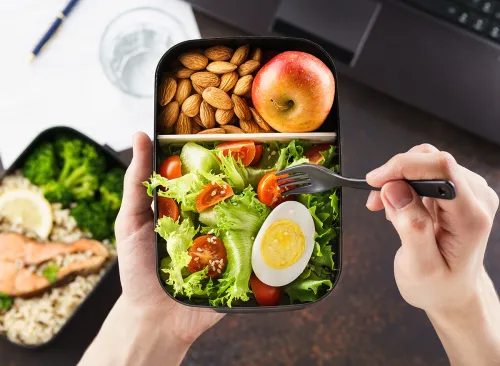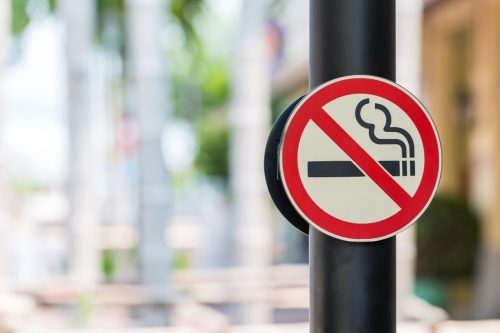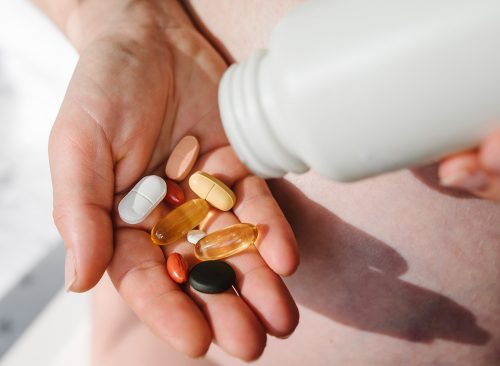10 Best Ways to Improve Your Immunity Naturally as COVID Cases Rise, Says Science
Here is how to stay safe.

Even before the COVID-19 pandemic, the approach of cooler weather meant asking the perennial question: Can I somehow avoid getting sick this winter? A good bet, both now and then, is working to strengthen your immune system. That doesn’t mean splashing out serious money on purported immune-boosting supplements (although there are two exceptions we’ll get to in a minute)—according to science, there are easy and inexpensive things you can do, variations on your everyday routine that can demonstrably strengthen your body’s ability to fight off disease. These are the best ways to improve your immunity naturally.

In a new study published in the journal Scientific Reports, Japanese researchers found that chemicals in tea, known as EGCG and TFDG, might attach to COVID’s spike proteins and prevent the virus from causing disease. “Omicron subvariants were effectively inactivated by green tea, matcha, and black tea,” the study authors wrote.

The CDC recommends that everyone older than six months get an updated COVID and flu vaccine this fall. In clinical trial data, Moderna’s updated COVID vaccine was found to create a strong immune response against currently circulating strains of the virus, including EG.5, which is currently the dominant variant in the U.S., and BA.2.86, a new, highly mutated subvariant of Omicron. (And yes, because both vaccines are made from components of viruses—specifically proteins and RNA, in the case of the COVID vaccine—they are natural.)

“While no food or supplement can ‘cure’ or even 100% prevent you from catching a virus like [SARS-CoV-2] or the flu, some foods have been shown to help bolster immunity,” registered dietitian nutritionist Cynthia Sass recently told Health. These include foods that are rich in antioxidants, including citrus fruits, red bell peppers, almonds, sunflower seeds, walnuts, beans, and garlic. Anti-inflammatory foods such as salmon, olive oil, legumes, nuts, and berries also provide good support.

Chronic stress causes the brain to produce more of the stress hormone cortisol, which has a number of negative physical effects, including weakened immunity. According to the American Cancer Society, people who experience chronic stress are more prone to the common cold and viral infections like the flu.

Exercise can give you a serious immunity boost. According to the National Institutes of Health, exercise flushes bacteria out of the lungs and airways, sends healing antibodies and white blood cells into the bloodstream, and slows the release of immunity-compromising stress hormones. Experts advise aiming for at least 30 minutes of moderate-intensity activity each day.

“Scientific evidence is building that sleep has powerful effects on immune functioning,” says the Centers for Disease Control and Prevention. “Studies show that sleep loss can affect different parts of the immune system, which can lead to the development of a wide variety of disorders.” Those include cancer, heart disease, obesity, diabetes, and dementia. Experts like the National Sleep Foundation recommend getting seven to nine hours of quality sleep every night.

Not only is alcohol a central nervous system depressant, it can suppress your immune system as well. “Alcohol compromises the body’s immune system and increases the risk of adverse health outcomes,” says the World Health Organization. To strengthen your immune system, abstain from alcohol or drink moderately, meaning no more than two drinks a day for men or one for women.

“Smoking harms the immune system and can make the body less successful at fighting disease,” says the CDC—particularly viral and bacterial infections of the lungs like COVID. “Additionally, smoking is known to compromise the equilibrium, or balance, of the immune system. This increases the risk for several immune and autoimmune disorders.”

Both vitamins C and D have been found to have a positive effect on immune function; people with deficiencies of the vitamins seem to be more susceptible to infections. For vitamin C, the recommended daily allowance is 90 mg daily for men and 75 mg for women; for vitamin D, it’s 600 IU daily for adults age 19 to 70 and 800 IU daily for adults over 70.
RELATED: Surprising Signs You’ve Already Had COVID

Washing your hands or using hand sanitizer regularly are good ways to avoid transferring viruses and bacteria to your eyes and mouth or transmitting them to others. Wash or sanitize before you eat, after preparing food, after using the restroom, and after coughing or sneezing. For handwashing, the 20-second rule is still a good guideline; for sanitizer, make sure you use a brand that’s at least 60% alcohol.














